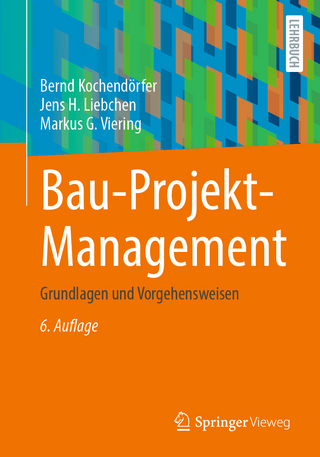
Project Benefit Realisation and Project Management
Wiley-Blackwell (Verlag)
978-1-119-36788-8 (ISBN)
Project management success does not automatically lead to project success. Many large projects fail to live up to expectations, with between half and two-thirds of large projects either failing to deliver or delivering few strategic benefits. Traditional project management resources focus on delivering a project on time and on budget, yet they fail to supply top managers, many of whom find themselves in the role of accidental project sponsors, with guidance on how to govern their projects to succeed.
Project Benefit Realisation and Project Management: The 6Q Governance Approach bridges the strategy to performance gap by providing boards, senior managers and project sponsors with the six critical questions necessary to diagnose the health of any project. Presenting a systematic framework developed from research cases of successful and unsuccessful projects in various types of organisations, this practical guide enables those in top management to determine if their strategy or policy is on track and to assess whether a project is likely to deliver the expected benefits. The text features real-world examples illustrating how concepts can be applied to different types of projects in engineering, construction, information technology, business transformation and many others. This must-have guide is designed to help top managers and other stakeholders:
Clarify the link between business outcomes, benefits, and strategy to evaluate where effort should be directed
Assess how much behavioural change is required to effectively implement strategy and realise desired benefits
Select a project sponsor committed to influencing key stakeholders to make necessary changes and intercede to resolve issues as they arise
Establish how success will be measured before a project begins, to gauge sponsor commitment and ensure project goals are not changed to match whatever is achieved
Ask if the right culture is in place to ensure all relevant information is being reported
Determine teams’ ability to adapt and change plans in response to issues arising in the project
Monitor if the project is on track to realising the benefits and have a process in place to cancel failing projects
Project Benefit Realisation and Project Management: The 6Q Governance Approach is an indispensable volume for board members, project sponsors, project advisors and those in senior positions who find themselves in the role of accidental project sponsors.
Raymond C. Young is a Senior Associate Professor in Project Management in the International Business School Suzhou (IBSS) at Xian Jiaotong Liverpool University (XJTLU). An international authority in the area of project governance, Young has a decade of management consulting experience. He is a Fellow of the Governance Institute of Australia, former Director of ISACA, past CIO within Fujitsu Australia, and a founding member of the committee that developed the governance standards AS8016 and ISO38500. Vedran Zerjav is an Associate Professor of Infrastructure Project Management in the Bartlett, UCL. He is a scholar of projects with an interest in a range of organisational issues in project- based organisational forms. His main areas of interest include strategic, operational, and value considerations in projects and his empirical focus is on urban infrastructure and its delivery. He is a qualitative researcher with an interest in hybrid and novel methodologies for project studies. Vedran’s engagement with the world of project management practice is extensive and spans research and advisory roles working with major infrastructure clients and professional bodies such as the Association for Project Management and Project Management Institute.
List of Illustrations
Preface 5
I. Introduction 6
The Board, Governance and Projects 6
Key Concepts 9
II. How to Govern Projects: 6 Questions
Q1. What is the desired outcome?
War Story – Lying to the Board
How to know whether Q1 has been addressed adequately
Q2. How much change?
Q3. Sponsor
Case Study – SkyHigh
Q4. Success Measures
Case Study – TechMedia
Commentary
Q5. The right project culture
Case Study – The Agency
Q6. Monitoring
Case Study – TechMedia (contd. from p26)
III. Tools and Techniques
Q1 Strategy – Diagnostic Toolkit
Case: A ‘routine’ project failure at TechServ
Q2 Change – Tools and techniques
Stakeholder Analysis
Business Process Mapping
Results Chain or Logic Model
Influencer Analysis
Case Study – The Agency
Q4 Measurement – Tools and techniques
Q6 Monitoring – tools and techniques
IV. Further insight
When do you ask each 6Q Governance™ question?
The best guidance available
V. The Future of Project Management and Governance
Where do we go from here?
The history and the future of project management
Conclusion
Appendix 1 – TechMedia
Appendix 2 –SKYHIGH INVESTMENTS
Appendix 3 –THE AGENCY
Bibliography
About the Authors
Index
| Erscheinungsdatum | 24.09.2021 |
|---|---|
| Verlagsort | Hoboken |
| Sprache | englisch |
| Maße | 170 x 244 mm |
| Gewicht | 227 g |
| Themenwelt | Technik ► Bauwesen |
| Technik ► Maschinenbau | |
| Wirtschaft ► Betriebswirtschaft / Management | |
| ISBN-10 | 1-119-36788-3 / 1119367883 |
| ISBN-13 | 978-1-119-36788-8 / 9781119367888 |
| Zustand | Neuware |
| Informationen gemäß Produktsicherheitsverordnung (GPSR) | |
| Haben Sie eine Frage zum Produkt? |
aus dem Bereich


